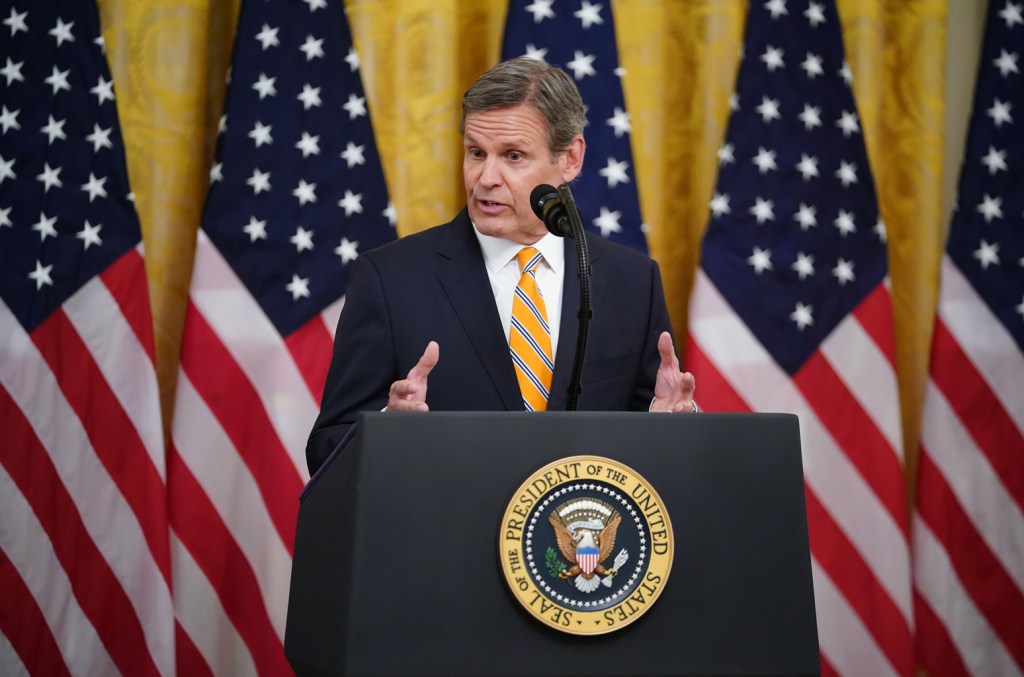Tennessee’s ‘ELVIS Act’ is Quickly Gaining Music Industry Support — RIAA, NMPA, A2IM, Recording Academy, & More


Photo Credit: Cody Lannom
Tennessee’s proposed ‘ELVIS Act’ to protect voice, image, and likeness against the unethical use of AI is rapidly gaining support from organizations across the music industry.
The Ensuring Likeness Voice and Image Security (ELVIS) Act, Tennessee’s proposed legislature to update the state’s Protection of Personal Rights law, is rapidly garnering support throughout the music industry. Introduced today in the heart of Nashville, the bill was presented by Governor Bill Lee, alongside Senate Majority Leader Jack Johnson, and House Majority Leader William Lamberth.
Such legislature would make Tennessee the first state in the nation to preserve individual voice, image, and likeness against unethical and irresponsible use of artificial intelligence in the form of deepfakes and audio cloning.
The rapid pace and ease at which AI is developing and generating forgeries risks “crowding out” legitimate works created by humans who may have spent years honing their talent and persona.
“I commend Governor Lee of Tennessee for this forward-thinking legislation. Protecting the rights to an individual’s name, voice, and likeness in the digital era is not just about respecting personal identity, but also about safeguarding the integrity of artistic expression,” says A2IM President and CEO Dr. Richard James Burgess.
“This act is a significant step towards balancing innovation with the rightful interests of creators and performers. It acknowledges the evolving landscape of technology and media, setting a precedent for responsible and ethical use of personal attributes in the music industry.”
“AI deepfakes and voice cloning threaten the integrity of all music. It makes sense that Tennessee state would pioneer these important policies which will bolster and protect the entire industry,” adds National Music Publishers’ Association (NMPA) President and CEO David Israelite.
“Responsible innovation has expanded the talents of creators — artists, songwriters, producers, engineers, and visual performers, among others — for decades, but use of generative AI that exploits an individual’s most personal attributes without consent is detrimental to our humanity and culture,” says RIAA Chairman and CEO Mitch Glazier.
“We applaud Governor Bill Lee, State Senate Majority Leader Jack Johnson, and House Majority Leader William Lamberth’s foresight in launching this groundbreaking effort to defend creators’ most essential rights from AI deepfakes, unauthorized digital replicas, and clones. The ELVIS Act reaffirms the State of Tennessee’s commitment to creators and complements Senator Blackburn’s bipartisan work to advance strong legislation protecting creators’ voices and images at the federal level.”
“As AI technology continues to develop, today marks an important step towards groundbreaking state-level AI legislation. This bipartisan, bicameral bill will protect Tennessee’s creative community against AI deepfakes and voice cloning, and will serve as the standard for other states to follow,” concludes Recording Academy CEO Harvey Mason Jr. “The Academy appreciates Governor Lee and bipartisan members of the Tennessee legislature for leading the way — we’re eager to collaborate with lawmakers to move this bill forward.”
Updated state laws such as the ELVIS Act punctuate the value of human individuality over those who would profit from AI-generated deepfakes and fraud. Tennessee’s foresight on this issue will help offer protections for songwriters, performers, and music industry professionals from the misuse of artificial intelligence, offering a blueprint for other states to follow.
Link to the source article – https://www.digitalmusicnews.com/2024/01/10/tennessees-elvis-act-is-quickly-gaining-music-industry-support/
Recommended for you
-
Fender JMJ Road Worn Mustang Bass, Faded Daphne Blue, Rosewood Fingerboard
$1.349,99 Buy From Amazon -
Podcast Equipment Bundle,Audio Interface with DJ Mixer and Condenser Microphone with USB Adapter
$98,98 Buy From Amazon -
Children Choir Real – Large authentic WAVE/Kontakt Samples/Loops Studio Library
$14,99 Buy From Amazon -
Recording King RKOH-05 Dirty Thirties Open Back Banjo
$379,99 Buy From Amazon -
The ONE Digital Piano with Lighted-up Teaching Keys, Piano Keyboard 88 Keys with Hammer Action for Beginner/Professional, Full Size Weighted Keyboard with Piano Stand/3-Pedal Unit/APP, White
$1.100,28 Buy From Amazon -
Electronic Drum Set – YUOIOYU Electric Drum Set Roll Up Potable Drum Kit MIDI Practice Drum Pad with Dual Built-in Speaker, Drum Sticks and Pedals,Christmas Birthday Gift for Kids Adult
$62,99 Buy From Amazon -
Best Choice Products 30in Kids Electric Guitar Beginner Starter Kit w/ 5W Amplifier, Strap, Gig Bag, Strings, E-Tuner, Picks – Black
$99,99 Buy From Amazon













Responses